Non English-language films are listed
under their English title (with the original language
title following in brackets). Where
a film has never been released with an
English title, it is listed under its original title
[with an English translation in
square brackets].
Film year is
the year when it was in production, not the year of
its first release.
A chronological discrepancy related to Roses
of
Picardy in a film is mentioned as a curiosity.
Such a mention is not judgmental.
Links to video-sharing websites: your
location may not be authorized.
 A new addition to this web page.
A new addition to this web page.
|
Roses of Picardy
Triangle Film Corporation (USA, 1918)
Colinette is a singer famous for her
interpretations of Roses of Picardy. She has a
passing affair with Henri, a gang leader who falls
madly in love with her; every evening, he enters her
house to secretly leave a bunch of roses on her
pillow. But Colinette loves a certain young engineer
who is on the verge of making a great discovery. This
discovery arouses such jealousies that there is a
price on his head, and it is Henri who is asked to
organize the murder. But Henri, consumed with remorse,
confesses the plot to Colinette. And, upon leaving her
house, he receives the bullet intended for his rival.
The end of the film shows Colinette spreading crumpled
rose petals over Henri's dead body.
The song is a recurring theme in the
film.
Advertisement
for the attention of cinema managers in the UK.
This silent film was accompanied in the
cinemas by one or more instrumentalists playing
different tunes, including Roses of Picardy.
Also in 1918, another film entitled Roses
of Picardy was produced in the UK, this time by
Union Photoplays. An actress loves an engineer whose
hydroplane is stolen by spies. Information related to
this film is extremely scanty. One can only assume
that Roses of Picardy was featured in it.
|
Roses of Picardy
directed by Maurice Elvey (UK, 1927)
A young British officer pays a visit to
the village in Belgium where he was billeted in the
Great War. He remembers Madeleine who, like a mother
to a child, gave him the comfort he craved when he
went to pieces after a bloody night attack.
During the war, Madeleine was in love
with a French soldier in hospital in Paris, though he
was not in love with her.
This silent film was accompanied by
music on records or by instrumentalists playing live.
Roses of Picardy was on the playlist. In some
cases, a singer took part in the show.
|
Camera Interviews: Mr F. E.
Weatherly, KC, the Famous Song Writer
Pathé Pictorial (UK, 1928)
newsreel
F. E. Weatherly was an English barrister
who wrote the lyrics of many songs, including Roses
of Picardy.
A close-up of a rose and the front page
of a Roses of Picardy sheet music are
superimposed.
The newsreel can be watched on the British Pathé channel on
YouTube.
|
Strong and Willing
Vitaphone Corporation (USA, 1930)
The american vaudevillian Trixie
Friganza sings Strong and Willing, a
caricature of Roses of Picardy written by
Neville Fleeson.
It tells how Rosie O'Kerry, from a one
horse town, went to the big city and was immediately
engaged in a music hall company. The manager did not
realize the only song she could sing was Roses of
Picardy. Never mind! She will fit the song into
the show's weekly theme.
She sang Roses of Picardy as a
two-part song all by herself, and carried on in a fox
trot style. Next week it was a
Spanish fandango. Another week, it was a New
Orleans jazz version.
Trixie Friganza sings and dances in this
five-minute-long quick-change act. She does not tell
how many weeks Rosie's engagement lasted!
Strong and Willing can be watched
on YouTube.
|
Rudy Starita and His New ‘Octarimba’ in Melodies of Long Ago
Pathé Pictorial (UK, 1936)
newsreel
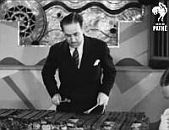
Rudy Starita plays Roses of Picardy
on the octa-rimba, accompanied by a guitarist and an
accordionist. They carry on with Love's Old Sweet
Song composed by J. L. Molloy.
The newsreel can be watched on the British
Pathé channel on YouTube.
|
A Friend Indeed
American Red Cross (USA, 1941)
announcement
Deanna Durbin,
blessed with a surprisingly mature voice, became a
singer star on radio at the age of 14 and a
Hollywood star the following year. She was
nineteen years old when she sang in this American Red
Cross Public Service Announcement.
With a
background symbolizing destruction, and an orchestra
playing the chorus of Roses of Picardy in the
sound track, she declares that every year she renews
her membership and continues, ‘I am very proud this year that the
Red Cross has asked me to sing some new words to a
very famous old song that I’m sure many of you will
remember.’
And she sings to the melody of the chorus of Roses
of Picardy, accompanied by the orchestra.
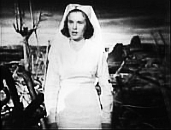
‘When there is grief in
this land of ours,
Then the Red Cross is our friend in need
Bringing relief as a friend indeed …’
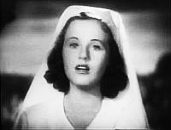
The
orchestra, in a vibrant coda, supports the final
title.

This announcement can be watched on YouTube.
|
Forever and a Day
directed by Edmund Goulding, and others
(USA, 1942)
a portmanteau film
This film was made with the entire
British colony in the Hollywood studios as a war
effort to raise money for charities. Producteurs,
writers, directors, actors and main technicians
volunteered. Haydn Wood agreed that no
fee would be paid for including Roses of
Picardy in the film.
The film tells in as many episodes,
the changing fortunes of one mansion in London from
1804 when it was built, through 1941 when it was
destroyed by the Blitz. The episode directed by Edmund
Goulding starts in
1917; the mansion is by then a boarding
house. On 11 Novembre 1918, the patrons—civilians or
military, manager and staff, and friends, have a party
to celebrate the armistice. They waltz and sing while
a sailor plays Roses of Picardy on piano.
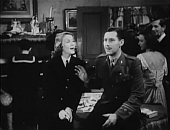
Forever and
a Day can be watched on VK Video. Roses of Picardy
is at 1:37:23.
|
Variety Jubilee
directed by Maclean Rogers (UK, 1943)
The son of the
Queen's Theatre manager visits his parents to
introduce his fiancée to them (he is a soldier on
leave). The show is about to begin; one can hear from
the foyer the orchestra playing Roses of Picardy.
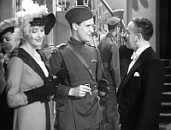
The sequence
begins with a close-up of a sign announcing that today
20 May 1915, soldiers pay half price—and yet in
actuality, Roses of Picardy was not
published in England until December 1916.
|
This Happy Breed
directed by David Lean (UK, 1944)
London, 1919: Frank Gibbons is
demobilized after four years in the war. He has got a
job in a travel agency which proposes package tours to
the main battlefields of the Great War.
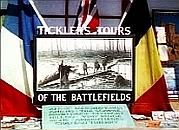
David Lean shows the agency's window
with flags and a picture of soldiers patrolling a
devastated field.
An orchestral arrangement of the
chorus of Roses of Picardy is the background
music for this shot.
Haydn Wood's Bird
of Love Divine is also performed in This
Happy Breed.
Lean will choose Roses of Picardy
again in his film A
Passage to India in 1984.
This Happy Breed can be watched
on YouTube. Roses of Picardy
is at 14:54.
|
I Live in Grosvenor Square
aka A Yank in London
directed by Herbert Wilcox (UK, 1945)
The Duke of Exmoor has given his
residence in London for use by American GIs. His
housekeeper doesn't like foreigners, so she says, but
she secretly sews their uniforms' buttons back on and
mends their socks. As she does, she listens to a music
box which plays Roses of Picardy.
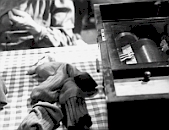
Herbert Wilcox will choose again Roses
of Picardy for his film The Courtneys of Curzon Street
in 1947.
|
Devil in the Flesh
(Le Diable au corps)
directed by Claude Autant-Lara (France,
1946)
François and Marthe meet again in a pub
in Paris. She suddenly lets him believe that she is
engaged; at this point, a service man at a piano
starts playing Roses of Picardy in a rather
joyful manner.
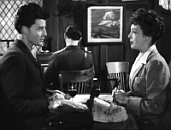
Later at a restaurant, François
alludes to the promised Nivelle Offensive. This places
the scene in April
1917, which was actually too soon for Roses
of Picardy to be well known in France.
|
The Courtneys of Curzon
Street aka Kathy's Love Affair
directed by Herbert Wilcox (UK, 1947)
England, 1900: despite his mother's
opposition, the lieutenant Edward Courtney marries
Kate, their chambermaid. A few months later, Kate
moves away from him so as not to hamper his military
career. She has always been a lovely singer and
succeeds in getting an engagement in a theatre, and
later becomes a star.
During the Great War in Arras, France,
Edward goes to an entertainment for the troops where
he unexpectedly sees Kate singing Roses of
Picardy, accompanied by a small orchesta. The
soldiers join in the chorus the second time around.
Edward goes backstage to find Kate, and they promise
to never part again.
Anna Neagle is Kate. She prerecorded Roses
of Picardy with a bigger orchestra than the
orchestra seen in the film.
Herbert Wilcox had chosen Roses of
Picardy before, for his film I Live in Grosvenor Square
in 1945.
|
The Good Old Days
produced by
Barney Colehan (UK, 1959)
television variety show series
In this BBC reconstruction of an
old-style show pre-recorded at the City Varieties in
Leeds and broadcast on Boxing Day 1959, the comedian
Smoothey of the double act Smoothey & Layton,
plays the chorus of Roses of Picardy on the
trumpet, backed by the pit orchestra conducted by Alyn
Ainsworth. Out of frame, the audience sings along.
The bill which introduces the show is
dated 26 December 1900, but Roses of Picardy
was actually premiered on 20 January 1917.
The show can be watched on YouTube.
Roses of Picardy is at 14:15.
|
Bandstand with B. H.
directed by Warwick
Freeman (Australia, 1961)
television variety show series
This series was a TCN weekly pop music
variety hour on Australian television pre-recorded in
Sydney. Brian
Henderson hosted the show and the musical
director was Bob Young.
In the programme broadcast on 2 December
1961, Lana Cantrell sang ‘a swinging revival of Roses
of Picardy,’ as announced by Henderson.
At the end of the number, Henderson
concluded, ‘Lana Cantrell ... being dynamic with Roses
of Picardy as it should be swung.’
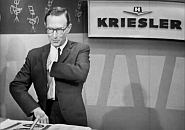
The show (incomplete) can be watched
on YouTube.
Henderson announcing Roses of Picardy is at
14:04.
|
Coronation Street
directed by Christopher McMaster (UK, 1962)
television serial: episode 129
Dennis Tanner has organized a variety
show in the Mission Hall for the benefit of the town's
old age pensioners. So many pensioners have flocked in
that the Hall is overbooked, but the artistic troupe
has not arrived by curtain time. Local pianist Minnie
Caldwell tries to take the edge off their wait by
playing old chestnuts from the Great War, to which the
audience sings along. Backstage, Tanner desperately
tries to figure out how to control the crowd, which
gets more and more boisterous while singing the chorus
of Roses of Picardy to Minnie's accompaniment.
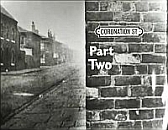
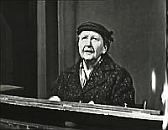
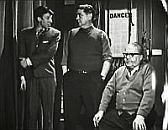
After the commercials, the traditional
image of the serial announcing Part Two of the episode
is accompanied by Roses of Picardy, in place
of the well known usual signature tune.
Except for a medium close-up of
a few of Dennis Tanner’s acquaintances in the
audience, one just has to imagine the Hall with its
crowd of spectators. It is not possible to tell whose
voices are singing Roses of Picardy.
This episode can be watched on YouTube.
Roses of Picardy is at 12:39.
|
The Great War - Part
11: Hell Cannot Be So Terrible
British Broadcasting Corporation (UK,
1964)
television documentary
This episode
is dedicated to the Battle of Verdun (1916)
interrupted by a contrasting sequence looking at
civilian life in France at the time.
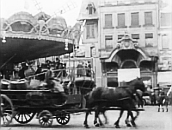
A pan shot
shows a funfair at Place Blanche in Paris. The
commentary tells that Paris is ‘still
pleasure-seeking after two years of war. The music
halls are full every night. Tipperary and
the Roses of Picardy were favourites
imported by the British.’
Roses of
Picardy, which was not published until
December 1916, could not actually have been a
favourite at the time of the Battle of Verdun.
This episode
can be watched on YouTube.
Roses of Picardy is mentioned at 28:37.
|
World War Ⅰ: Tipperary and
All That Jazz
Columbia Broadcasting System (USA,
1964)
television documentary: episode 20
‘The First
World War has a special background music of its own.
Spirited, comic, sentimental. An innocent counterpoint
to a brutal war.’ In this episode, different
experiences in American soldiers' lives are
accompanied by as
many British or French hits from the period.
In and around the trenches, life in the mud is
supported by Roses of
Picardy in a sentimental mood.
Morton
Gould, the composer for the whole series, has
arranged for this episode numerous tunes. The chorus
of Roses of
Picardy is sung by a tenor accompanied by
harmonica and guitar in a calm arrangement.
This episode
can be watched on YouTube.
Roses of Picardy is at 6:04.
|
Kiss Me, Stupid
directed by Billy Wilder (USA, 1964)
When Dino, a charming and lecherous Las
Vegas singer, passes through Climax, Nevada, he
doesn't count on meeting the gas-station attendant, a
would-be lyricist who writes pop songs with the local
piano teacher. Both contrive a scheme, with the help
of a nightclub hostess, to have Dino sing one of their
songs on an upcoming TV special.
Their repertoire includes ‘a nice little
waltz, When It's Pussy Willow Time in Picardy’.
In this way they try to take advantage of the Roses
of Picardy's fame.
Kiss Me, Stupid can be watched on
YouTube. The title When It's
Pussy Willow Time in Picardy is quoted at
1:26:58.
|
It's the Great Pumpkin,
Charlie Brown
directed by Bill Melendez (USA, 1966)
cartoon
Snoopy wearing his World War Ⅰ flying
ace costume is entertained by Schroeder who plays
famous wartime tunes on piano. He bursts into tears
when he hears Roses of Picardy.
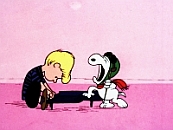
|
[Picardie
Actualités :]
Il y a cinquante ans… Doullens 26 mars 1918, le
commandement unique
[Picardy News: Fifty Years Ago…
Doullens 26 March 1918, The Sole Command]
Office de radiodiffusion
télévision française (France, 1968)
television newsfilm
On 26 March
1968, the regional television news in Picardy tells
how, on 26 March 1918 at Doullens town hall, General
Foch was granted the coordination of the allied
armies. The newsfilm begins as follows:
‘Spring 1918
... In Doullens, barely 80 kilometers away from the
front, right in the heart of the English sector, the
roses of Picardy were slow to bloom while over there
to the east, the red blood of men still watered the
fertile soil of the Aisne department.’
While the
Germans continue their advance towards the west, on
23 March ‘at 4 p.m., Pétain and Gough first meet in
Dury, at this castle which served as Foch's
headquarters two years earlier. Yesterday, the
English demanded three French reinforcement
divisions … Tomorrow, they may need thirty to cover
Amiens. Pétain, who wants to cover the Champagne
area, hesitates. The French and the English are
breaking their agreement, the every man for himself
policy is emerging. In Paris, Foch asks Clemenceau
to create a centralized body to run the war.’
‘On the
evening of 24 March, another meeting, Pétain-Haig,
in Dury … The separation between the Allies is
consummated, both in people's minds and on the
ground. The front line is definitely overpowered by
the enemy … The situation is desperate on the
morning of the 26th.’
Around
midday on 26 March, the French and the English
meet in Doullens at the town hall. President
Poincaré and Clemenceau grant Haig the French
reinforcements he calls for, while they can
appoint Foch as coordinator of the Allied armies.
The Germans had continued their advance and now
Doullens is only ten kilometers from the front.
The
commentary ends: ‘One spring day in 1918, the
English and the French at last realized that only
one person should rule them all. General Foch was
that one, and it was in Doullens that
psychologically the tragedy unfolded. And it was
also thanks to him that [the Germans] never
occupied Amiens.’
Roses
of Picardy: the introduction of the arrangement for
his orchestra by George Melachrino, then the beginning of it, accompany the
beginning of this newsfilm. Then twice this
arrangement serves as background music. Finally, a
very short excerpt from the introduction concludes
the newsfilm after the commentary ends. This
arrangement is based on the melody of the song's
chorus.
These
excerpts are from the recording by the Melachrino
Strings and Orchestra (UK, 1963?).
This
newsfilm can be watched on Images de Picardie. Roses
of Picardy is at 0:00, 2:23, 3:53, and 9:11.
|
Oh! What a Lovely War
directed by Richard Attenborough (UK,
1968)
At an Army Ball in December 1915, soon
after Douglas Haig has been appointed as the new
Commander in Chief of the British expeditionary force,
guests are waltzing to the music of Roses of
Picardy.
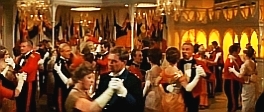
There is a chronological discrepancy
here: Roses of Picardy was actually composed
in 1916.
Oh! What a Lovely War can be
watched on VK Video. Roses of Picardy
is at 1:16:24.
|
Those Daring Young Men in
Their Jaunty Jalopies aka Monte
Carlo or Bust!
directed by Ken Annakin (Italy, France,
UK, 1968)
This is a farcical film about the
Monte Carlo rally in the 1920s. The competitors from
various places in Europe drive to Chambéry, the common
destination where they are billeted at the same hotel.
Before going to bed, Willi Schickel
finds it a bit long before he can access the shared
bathroom. Actually, Lt.
Barrington is in there taking a hot bath and
delighting in singing ‘Roses are blooming in Picardy.’
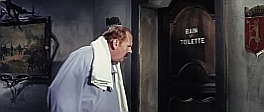
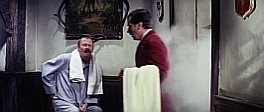
When at last
Schickel can get to bed, he is joyously singing to
himself the first bit of Roses of Picardy.
Those
Daring Young Men in Their Jaunty Jalopies can be
watched on VK Video. Occurrences of Roses
of Picardy are at 1:10:53, 1:13:55, 1:14:24,
1:15:00, and 1:15:14.
|
Solveigin
laulu [Solveig's
Song]
directed by Reima Kekäläinen (Finland, 1973)
television series: episode 3
During the 1930s and 1940s in Helsinki,
Solveig had a difficult childhood and adolescence,
what with a bad mother and a loving but ailing father.
Later in the 1950s, she is walking in
the snow with her boyfriend; this is the day of her
first kiss. Roses of Picardy is the
background music to this moment of happiness.
References are not known for this
recording of the chorus of Roses of Picardy
for saxophone with orchestra.
|
Upstairs
Downstairs: Peace out of Pain
directed by Christopher Hodson (UK, 1974)
television series: season 4, episode 13
London, November 1918, a few days before
the armistice: Hazel Bellamy is in bed with a high
fever. One can hear Roses
of Picardy played on a gramophone by her
husband in his room next door. The doctor wishes that
Hazel rests in a quieter ambience.
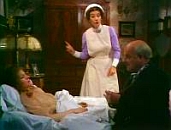
References are not known for this
recording of the chorus of Roses of Picardy
sung by a tenor with piano accompaniment.
|
When the Boat Comes In: A
Land Fit for Heroes and Idiots
directed by Ronald Wilson (UK,
1975)
television series: season 1, episode 1
A town north-east of England, 1919:
Sergeant Jack Ford returns on leave pending discharge.
At Tom and Mary's wedding reception,
Tom's brother and sister talk together about a
shell-shocked veteran who has returned to their
town—he was buried alive during a German attack; she
realizes that Jack Ford helped to dig him out.
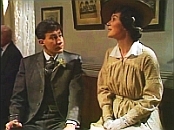
Tom, then Tom's father, and later Mary,
ask Ford questions about her brother who was killed in
combat—he was in the same company as Jack and the
rumour has it that he was gay.
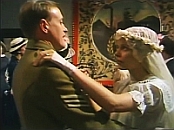
Amid the
hubbub of chatting and dancing, one can faintly
discern a pianist gaily plunking out the chorus of Roses
of Picardy in a bouncy new style.
This episode
can be watched on YouTube.
Roses of Picardy is at 30:14.
|
Aces High
directed by Jack Gold (UK, 1975)
October 1917: a Royal Flying Corps
squadron is based near Amiens in Picardy. At the mess
hall, the captain enjoys playing the chorus of Roses
of Picardy on the piano.
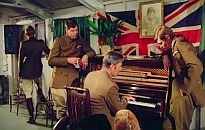
Superior officers and lower ranks have
dinner together. A few pilots hum Roses of
Picardy to hide their concern about a missing
comrade-in-arms. When his death is confirmed, they
carry on humming as if nothing had happened.
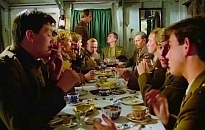
A couple of days later, their leader
takes some of his men on a binge to a nightclub in
Amiens. There, a singer gives the chorus of Roses
of Picardy, accompanied by a pianist.
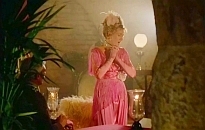
Jeanne Patou sings the French version
which actually was published in 1918.
Aces High can be watched on VK Video. Roses of Picardy
is at 21:06, 24:08, and 1:25:25.
|
All You Need Is Love, The
Story of Popular Music: Jungle Music, Jazz
directed by Tony Palmer (UK, 1976)
television documentary: episode 4
A sequence of this episode dedicated to
jazz music features an interview with the jazz pianist
George Shearing, and the George Shearing Quintet in
concert.
They play a short arrangement of the
chorus of Roses of Picardy in a medley of jazz
standards.
This episode can be watched on YouTube. Roses of Picardy
is at 38:52.
|
The Good Old Days
devised and
produced by Barney Colehan (UK, 1976)
television variety show series
In this BBC reconstruction of an
old-style show pre-recorded at the City Varieties
Theatre in Leeds and broadcast on 20 January 1977, the
comedian Dailey of the double act Dailey & Wayne,
barely starts singing the chorus of Roses of
Picardy before he is interrupted for good by the
antics of his partner Wayne. They are accompanied by
the pit orchestra conducted by Bernard Herrmann.
This show can be watched on YouTube.
Roses of Picardy is at 23:21.
|
Vera Lynn Sings
directed by Keith Beckett (UK, 1977)
television variety show
Vera Lynn invited the jazz pianist
George Shearing to join her in her television recital
of 1977.
The George Shearing Quintet played a
short arrangement of the chorus of Roses of
Picardy in a medley of jazz standards.
This show can be watched on YouTube. Roses of Picardy
is at 10:23.
|
A Christmas to Remember
directed by George Englund (USA, 1978)
television movie
The opening
credits' music starts with a
lively fiddle tune followed by a warm rendition of the
beginning of the chorus of Roses of Picardy,
soon followed by a romantic melody, all performed by
an orchestra.
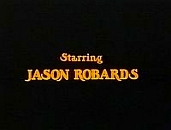
At a small
country fair in Minnesota, loud sounds from a drum and
bugle corps playing Roses of Picardy provide
the fun climax for the unveiling of a huge and
powerful modern tractor. Russell McCloud is
super-impressed with the big machine, and even climbs
in during the demonstration ride. As he rides in the
cab, he muses about his grandpa's old tractor that was
such an important part of his youth on his
grandparents' farm. Then the fortissimo sounds of the
drummers and buglers playing Roses of Picardy
dissolve into a mellow orchestral version.
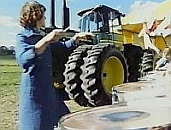 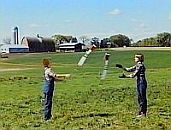 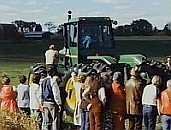 
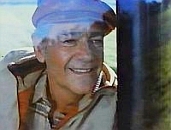 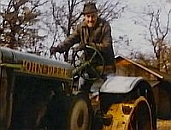
Christmas Eve
1932: grandpa Daniel suddenly pours his heart out,
reflecting on his son's life, their difficult
relationship together, and his untimely death in the
Great War.
He and grandma
Emma have a rare, tender hug which gladdened young
Russell. Three bits of Roses
of Picardy quickly follow each other. First, a
meditating orchestral rendition, followed by the pure
sound of a classical violin accompanied by solo guitar
to the words (if they had been sung) ‘But
there's one rose that dies not in Picardy!’, followed by the tinkle of a bell to the
words (if they had been sung) ‘'Tis
the rose that I keep in my heart!’
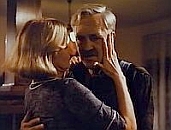 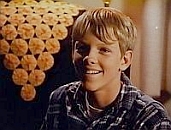 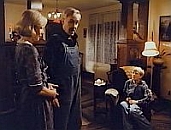
Daniel suddenly wants to surprise and
please his wife. Though Emma thinks she is merely
indulging in a
celebratory Christmas Eve cider, her
husband has purposely given her stump juice so she
will be sound asleep when he and Russell start
pulling her harmonium behind the old tractor to the church, in time to surprise her on
Christmas morning.
Russell helps his tipsy grandmother to
bed. The moving of the harmonium out of the house is
accompanied by a
mellow orchestral version of Roses of
Picardy's chorus. Over its last chord (held
for several seconds), a
serene bugle call with a drum roll
symbolizes the spirit of the deceased soldier son,
Russell's uncle.
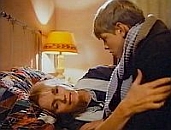 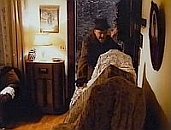 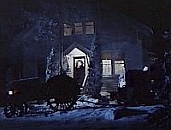 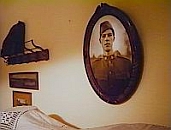
After the
church sequence, the movie reverts back to the small
country fair. The mellow
orchestral version of
Roses of Picardy's chorus
starts again, and will develop through the final
credits, ending with the
bugle call with a drum roll. The grown-up
Russell has walked over from the fairground to the
nearby graveyard where his grandparents are buried,
musing to his grandpa’s headstone and to his wife: ‘Just want to show the big machine to
grandpa. He would'a loved it so!’
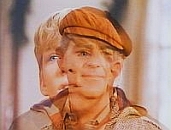 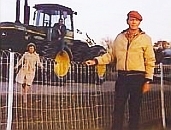 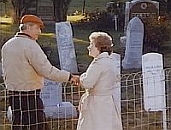
Most
of A Christmas to Remember can be watched on
YouTube. Roses of Picardy
is at 2:17, 53:41, 1:01:09, and 1:27:29.
|
The Dick Cavett Show: [Oscar
Peterson]
directed by Richard Romagnola (USA,
1979)
television talk show series
During this WNET talk show, Dick Cavett
and his guest Oscar Peterson discuss the different
stylistic trademarks of other prominent jazz pianists,
including ‘the relaxed block chords’ of George
Shearing which are likened to ‘the fullness of a sax
section.’ Peterson plays the celebrated start of the
chorus of Roses of Picardy to demonstrate
Shearing's style.

Later, Peterson uses the same bit of Roses
of Picardy again, demonstrating two possible
contrasting harmonic progressions.
The talk show (incomplete) can be
watched on YouTube.
The discussion on George Shearing is at 15:09, and Roses
of Picardy is again at 17:53.
|
MASH: Old Soldiers
directed by Charles S. Durbin (USA,
1979)
television series: season 8,
episode 18
The Korean war in 1950: refugee orphans
are looked after at an American field hospital.
Colonel Potter withdraws into his office to remember
his four comrades-in-arms of the Great War; the last
of them has just died in hospital in Tokyo. Potter
plays a record of Roses of Picardy together
with a Korean kid who has stepped into the office when
he heard the music through the door.
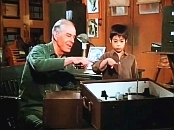
This recording of Roses of Picardy
was probably recorded especially for the episode. It
is a duet for violin and accordion with added clicks
typical of a 78 rpm record.
|
Montand d'hier et
d'aujourd'hui [Montand of Yesterday and Today]
directed by Jean-Christophe Averty
(France, 1980)
television variety show
This variety show was based on the new
vinyl disc recorded by Yves Montand in 1980, ‘Montand
d'hier et d'aujourd'hui,’ with among other songs Dansons
la rose [Let's Dance the Rose].
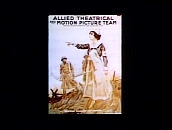 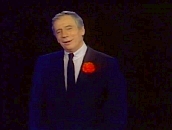 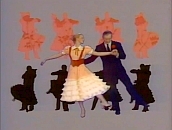
The disc's track accompanies Montand who
lip-synced for the filming of the show.
Hubert Rostaing had conducted the
orchestra.
Dansons la rose is a song created
by Montand in 1980 ‘in memory of’ and to the melody of
the chorus of Roses of
Picardy with lyrics by Eddy Marnay.
An excerpt from the show with Dansons
la rose can be watched on YouTube.
|
The Good Old Days
produced by
Barney Colehan (UK, 1980)
television variety show series
In this BBC reconstruction of an
old-style show pre-recorded at the City Varieties
Theatre in Leeds and broadcast on 9 July 1980, Vince
Hill sings the chorus of Roses of Picardy. He
is accompanied by the pit orchestra conducted by
Bernard Herrmann.
This show can be watched on YouTube.
Roses of Picardy is at 30:14.
|
Cream in My Coffee
written by Dennis Potter and directed
by Gavin Millar (UK, 1980)
television play
Jean and Bernard Wilsher, an unhappy,
aging couple, have returned in the summer of 1980 to a
seaside resort of faded elegance, in an effort to
recapture some trace of the passion which they had
shared there on their only premarital weekend
forty-six years before.
A long pan shot finds them dozing on the
beach among younger holidaymakers.
Their inner voices are conversing:
Bernard – You never listen to what I say!
Jean – […] I can't read your mind, can I?
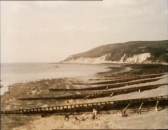 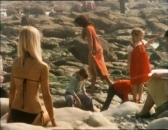
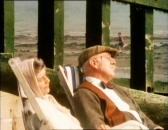 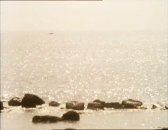
An
arrangement of the complete Roses of Picardy
chorus for string trio is the background music to
the pan shot.
The chorus
of Roses of Picardy was arranged for the
movie by Max Harris. The performers are not
credited.
Dennis
Potter will write another television play produced
in 1994, Message
for Posterity, in which he will include
Roses of Picardy.
Cream in
My Coffee can be watched on OK.RU. Roses of Picardy
is at 1:11.21.
|
Montand 81
directed by Guy Seligmann (France,
1981)
televised recital
Yves Montand's recital at the Olympia
Hall in Paris was recorded by Antenne 2 in 1981.
Montand sings (and dances) Dansons
la rose [Let's Dance the Rose].
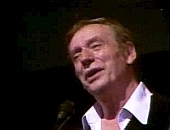 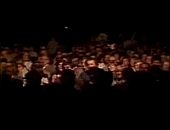 
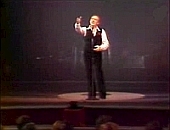
Bob Castella
on the piano accompanies Yves Montand and leads the
instrumental ensemble.
Dansons
la rose is a song created by Montand in 1980
‘in memory of’ and to the melody of the chorus of Roses
of Picardy with lyrics by Eddy
Marnay.
|
Raymond Siozade: Roses
de Picardie de Wood HAYDN [sic]
Télévision française 1 (France,
1981)
television variety show
For the television show ‘Le Monde de
l'accordéon [The World of Accordion]’, the
accordionist Raymond Siozade sings Dansons la rose
and accompanies himself on a button electronic
accordion.
The host Jacqueline Huet tells that
Siozade will treat us ‘with the famous roses of
Picardy’.
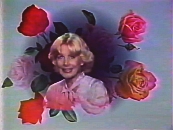
 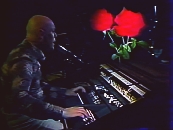
Dansons
la rose is a song created by Yves Montand in
1980 ‘in memory of’ and to the melody of the chorus
of Roses of
Picardy with lyrics by Eddy Marnay.
This archive
video is from the accordionist Alberto Garzia's
collection.
The video
can be watched on YouTube.
|
Eureka
directed by Nicolas Roeg (UK,
1982)
1925: Arctic prospector Jack McCann
becomes one of the world's wealthiest men when he
literally falls into a
mountain of gold. Some twenty years later he
lives in luxury on a Caribbean island that he owns.
But Miami mobsters want his island to build a casino.
They attack him in his mansion and beat him to death.
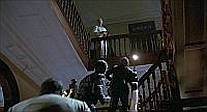 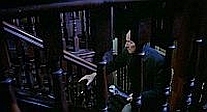 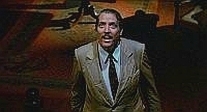 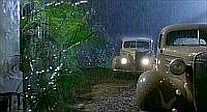 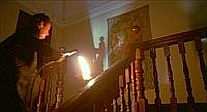 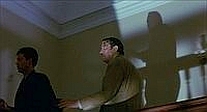 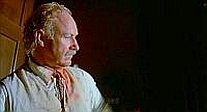
There is a gramophone in the entrance
hall with a record ready to be played. One of the
gangsters starts the machine, which plays Roses of
Picardy.
Sung serenely by Jo Stafford with Paul
Weston and his orchestra (USA,
21 November 1947), the chorus of Roses of
Picardy accompanies the beginning of this
otherwise violent sequence. (Earlier in the movie, a
radio broadcast gives a clue as to when the murder
takes place: the battle of Iwo Jima, in February or
March 1945.)
Eureka
can be watched on VK Video. Roses of Picardy
is at 1:28:25.
|
One Deadly Summer
(L'Été meurtrier)
directed by Jean Becker (France, 1982)
Éliane was born after her mother was
raped by three men, one of them being a street
musician who would go from city to city pulling a
player piano.
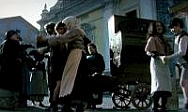
He is dead now but under a drive for
vengeance, Éliane flirts with his son and soon asks
him about the player piano. ‘Hey,
how did you hear about it? … It's a pity it can play
one tune only!’
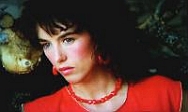
They make love
that night at his place, and the next morning she
searches and finds the player piano abandoned in a barn. She
dusts it off and unveils the monogram M, the initial
of the man who could have been her father.
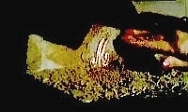
Another day,
haunted by the rape, Éliane spins herself around and
around until she faints beside the player piano.
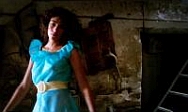
Later in the film, a flashback develops
at length as to how the rape happened.
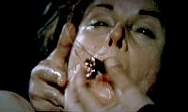
Jean Becker and the composer Georges
Delerue chose Roses of Picardy as the only
tune which the player piano can play. Actually, it is
never activated in the film. Roses of Picardy
is only heard as a haunting recollection at each
instance described above.
|
Montand international
directed by Guy Job
(France, 1983)
documentary
This documentary retraces the series of
recitals that Yves Montand gave in 1982 in Paris and
around France, and especially those he gave during a
world tour that took him to Brazil, the United States
and Japan.
He is seen singing (and dancing) Dansons
la rose [Let's Dance the Rose] at the Greek
Theatre in Los Angeles.
Bob Castella on the piano accompanies
Yves Montand and leads the instrumental ensemble.
Dansons la
rose is a song created by Montand in 1980 ‘in
memory of’ and to the melody of the chorus of
Roses
of Picardy with lyrics by Eddy Marnay.
This
documentary can be watched on YouTube. Dansons la rose
is at 26:46.
|
The Indomitable Teddy
Roosevelt
directed by Harrison Engle (USA, 1983)
documentary
Theodore Roosevelt was president of the
United States from 1901 to 1909. In 1914, he
campaigned unsuccessfully for the US to join the
Allies when World War Ⅰ broke out.
His four sons served in combat; two were
wounded, and the youngest, Quentin, was killed in 1918
when his airplane was shot down.
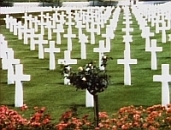
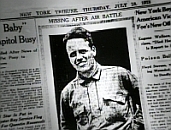
For Theodore Roosevelt it was a long,
lonely walk back to the house, to tell his wife Edith
the terrible news.
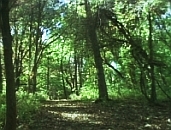
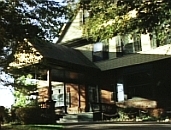
‘To feel that one
has inspired a boy to conduct that has resulted in his
death, has a pretty serious side for a
father.’
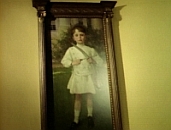
The music of John Philip Sousa
accompanies this feature-length documentary, except
for this sequence which is accompanied by the chorus
of Roses of Picardy
originally sung twice in a row
by the tenor John McCormack
with an orchestra conducted by Josef Pasternack
(Camden, New Jersey, USA, 1919).
|
A Passage to India
directed by David Lean (UK, 1984)
India, the 1920s: the English
Administrator of Chandrapore (an imaginary town) has
condescended to give a
reception for the local Indian elite in the
Club's garden. This is an unprecedented event which he
hopes will not be repeated, so that the Club will
remain strictly forbidden to Indian people. During the
reception, a military band plays Roses of Picardy.
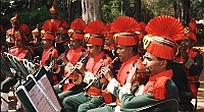
David Lean had chosen Roses of
Picardy before, in his film This Happy Breed in 1944.
|
Le Téléphone, un pont entre
nous [The Telephone, a Bridge Between
Us]
Ministère des P.T.T. (France, 1984)
television commercial
The French Ministry for the postal
services and the telephone network encourages
individuals to have a
telephone installed.
‘Today, the telephone is no longer a
luxury, it is part of our life. And so that men can
call each other, talk to
each other, get closer to each other,
installing a telephone is getting faster and cheaper.’
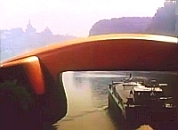 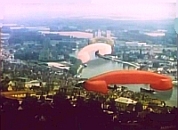 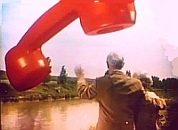 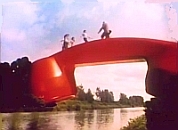
The commercial is accompanied by an
excerpt from the orchestral track of Dansons la
rose [Let's Dance the Rose]—a song from the
vinyl disc ‘Montand d'hier et d'aujourd'hui’ [Montand
from Yesterday and Today] recorded by Yves Montand in
1980. Hubert Rostaing conducted the orchestra.
Dansons la rose is a song created
by Montand in 1980 ‘in memory of’ and to the melody of
the chorus of Roses of
Picardy with lyrics by Eddy Marnay.
The commercial can be watched on ina.fr.
|
Trous de mémoire
[Lapses of Memory]
directed by Paul Vecchiali
(France, 1984)
Françoise (Françoise Lebrun) and Paul
(Paul Vecchiali), who separated four years ago, meet
again in a park on Paul's initiative. He wants her to
help him remember a song which haunts him, and he is
hoping to win her back.
Françoise –
Can you remember the lyrics?
Paul – I can't … I see a village, a square in the
village, a dazzling sun. A fête, and it seems to me...
– Could it be your village?
– Sorry?
– In your home area?
– Yes … It was a village fair, yes. And yet we had a
dance on this tune. Though...
– Together?
– Ah yes, though at the same time you were not there,
I think. It's a childhood memory, I was ten. The
roses, the roses. I'm almost certain about this.
Françoise softly sings:
Roses
are shining in Picardy,
In the hush of the silver dew,
Roses are flow'ring in Picardy,
Paul –
Yes, this is it.
Françoise
carries on:
But
there's never a rose like us.
Paul
follows on, humming.
Françoise makes a mistake:
– No, 'tis not it.
She corrects herself:
And
the roses will die with the summertime...
Paul – Thank you.
Françoise – That memory, it is my own.
– Your own?
– Yes.
– How come, your own? You, from the Nord
department, in the sun!
– Yes. I told it to you. Think about it.
– Well I never! Tell me. Tell me.
– Goodbye.
She goes.
The dialogue for the film was
improvised. Françoise Lebrun chose Roses of
Picardy before shooting, but neither she
nor Paul Vecchiali knew when the song would take
place in the film.
Note that Lebrun made her
character slip: 'But there's never a rose like
us,' instead of 'But there's never a rose like
you.'
Trous de mémoire can be
watched on INTERNET ARCHIVE.
Françoise Lebrun sings Roses of Picardy
at 1:12:26.
|
He Died with His Eyes Open
(On ne meurt que
deux fois)
directed by Jacques Deray (France,
1985)
The detective Staniland investigates
the murder of a well-known pianist, Charly Berliner.
He hears from a
barman about how Charly, when he couldn't
bear an unhappy love affair, would go to the bar late
at night and sit at the piano: ‘You wouldn't believe
it, a great artiste like him, he was on familiar terms
with Beethoven … he played the Roses of Picardy,
old crap from the '20s!’ The detective and the barman
have fun with humming together the chorus of Roses
of Picardy.
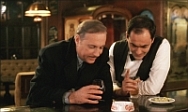
He Died with His Eyes Open
can be watched on OK.RU. The scene is at 1:20:30.
|
A Month in the Country
directed by Pat O'Connor (UK, 1986)
Summer in the early 1920s: Tom Birkin, a
young man emotionally suffering from his participation
in the Great War, has arrived by train from London to
a remote Yorkshire village for a month's job,
restoring a mural in the local church. To
keep him company, the
stationmaster's children, bring a gramophone they
install upon the baptismal font. The first record they
put on for him is Roses of Picardy.
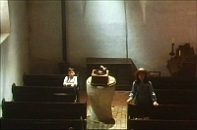
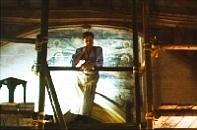
While it is playing, the children have
almost an argument with Tom about the lilies in a
religious painting they have at home; Tom muses, ‘Why just lilies? Why not roses, or lilies and
roses, or just roses, or roses and daisies?’ He will not allow them to climb up the
ladder and look at his work in progress.
One morning he thinks he hears the
children entering the church and he immediately tells
them that he doesn't want Roses of Picardy
today. When he turns around, he sees the vicar's
charming wife who dares join him on the scaffolding to
look at the mural; she wears a hat with one of the old
roses she grows in the vicarage's garden.
The chorus of Roses of Picardy,
arranged for violin and piano, followed by a few bars
for string orchestra, is heard in the film once only.
Yet rose symbolism pervades through several scenes.
|
The Whales of August
directed by Lindsay Anderson (USA,
1986)
Two elderly widowed sisters, Sarah and
Libby (Libby is blind) are staying together in the
family's summer cottage on an island off the coast of
Maine.
One morning, Sarah picks a red rose and
a white rose from the garden. An orchestral
arrangement of the beginning of Roses of Picardy's
chorus accompanies Sarah's visit to the garden until
she picks the red rose.
In the evening, when she is alone, Sarah
celebrates her forty-sixth wedding anniversary. She
tenderly looks at a picture of her late husband (in a
military uniform) and talks to him with a glass of
wine in her hand, the red rose and the white rose
beside her: ‘46 years, Philip, 46 red roses, 46 white,
white for truth, red for passion.’ Then she puts the
gramophone on and listens to the song Roses of
Picardy, with the red rose in her hand, looking
out through the window and musing about the intimacy
between them.
The next morning, as often, Libby asks
Sarah to walk her out to the point, the spot from
which they used to watch the whales go by. The same
orchestral arrangement of Roses of Picardy's
chorus accompanies the start of their walk, and ends
on a shot of Libby's rocking chair.
Roses of Picardy's chorus was
arranged for the film and conducted by Derek
Wadsworth. And Sarah listens to the recording by the
tenor John McCormack, accompanied by an orchestra
conducted by Josef Pasternack (Camden, New Jersey,
USA, 1919)—one edit in the soundtrack cut out the
first verse, so the viewer hears the orchestral intro
and the chorus only as originally sung by McCormack
twice in a row.
The Whales of August can be
watched on YouTube. The arrangement is at
6:33 and again at 1:26:30, and the recording by John
McCormack is at 1:12:08.
|
Cause célèbre
directed by John Gorrie (UK,
1987)
television play
England, 1934: Alma, an ex-pianist and
composer, talks to George, her young servant. Learning
that he was born in November 1916, she confides to him
that she married her first husband in 1916. He was 19
when he left for the French front, and she never saw
him again. Seated at her piano, she nostalgically
tinkles the keys and hums the chorus of Roses of
Picardy, and bursts into tears.
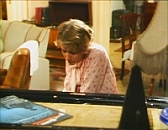
|
Chasing Rainbows
directed by William Fruet (Canada,
1987)
television series: episode 2
Montreal, spring 1919: Jack Kincaid and
Christopher Blaine who became friends in France in the
Great War, are readapting to peacetime life. At the
Welcome Home Boys Ball, Jack meets Paula Ashley and
feels rather interested in her. He does not know yet
that she is Christopher's girlfriend since before the
war.
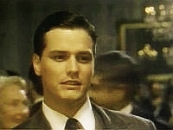 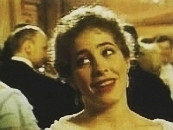
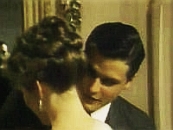
Out of frame, a small music ensemble
plays the chorus of Roses of Picardy for the
dancers; first with their female vocalist sometimes
forgetting the words and scatting
‘la la la, la li …’
and then, with the instruments alone.
This episode can be watched on YouTube.
Roses of Picardy is at 34:08.
|
Montand de tous les temps [Montand of all time]
directed by Marie-Sophie Dubus
and Frédéric Rossif (France, 1987)
documentary
This three-part documentary covers forty
years of Yves Montand's career in song. It is made of
archival documents of the singer, filmed in rehearsal
or giving a recital, on stage or for television.
The opening credits, identical for each
part, present a series of photographs of Montand in
his private life and in his career as a singer and a
film actor, and finish with a shot of Montand singing
a few words from Dansons la rose [Let's Dance
the Rose]. The credits are accompanied by an edit,
interspersed with applause, of the soundtrack of a
document in which Montand performs Dansons la rose
before an audience.
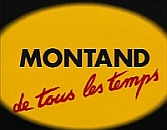 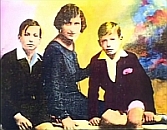
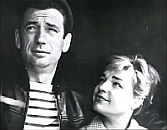
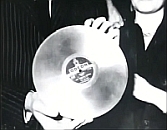 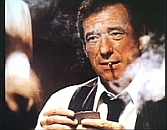 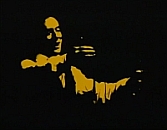
In the second
part of the documentary, Yves Montand in a television
studio croons Dansons la rose alone, then a
piano and a bass out of frame repeat the melody and
Montand joins in for the final line.
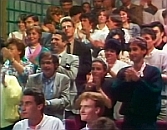 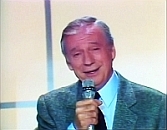 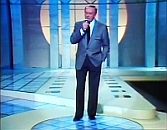
The edited
soundtrack and the last shot of the opening credits
are from Yves Montand's recital at the Olympia Hall
in Paris, as recorded
for television in 1981. And Montand singing in
a television studio is from ‘Grand public,’ a
programme directed by Rémy Grumbach in 1986.
Dansons
la rose is a song created by Montand in 1980
‘in memory of’ and to the melody of the chorus of Roses
of Picardy with lyrics by Eddy
Marnay. Incidentally, it is titled Roses de
Picardie in the end credits of
the second part.
The
documentary can be watched on OK.RU: part 1, part 2, part 3. Dansons la rose
is at 0:58 (part 1), 0:11 and 49:21 (part 2), and
0:12 (part 3).
|
Another Woman
directed by Woody Allen (USA, 1988)
Marion is a New York philosophy
professor on sabbatical leave who is facing a mid-life
crisis. She pays a visit to her brother Paul with whom
she long had a difficult relationship.
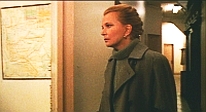
In the corridor leading to Paul's
office, one can hear Roses of Picardy played
in a nearby room. While they talk, Paul goes and shuts
his office door, putting an end to this musical
presence.
Woody Allen chose Frankie Carle's piano
rendition of Roses of Picardy (New York,
1947).
For a previous film, Radio Days
(1986), Allen wrote a scene about an amateur radio
channel: the Coopers broadcast from their garage; the
mother introduces the programme, and plays the piano
accompaniment for her daughter who sings Roses of
Picardy; the father is in charge of all
technicalities. The scene was shot but it was not
included in the final version of the film.
Allen will choose again Roses of
Picardy for his film Wonder
Wheel in 2017.
|
World War I Songs: Featuring
the RMSM Junior Choir
The Bands of HM Royal Marines (UK,
1988)
videoed concert
The Junior Choir of the Royal Marines
School of Music performed a medley of World War I
songs which included the chorus of Roses of
Picardy, at the Mountbatten Festival of Music in
February 1988 at the Royal Albert Hall, London.
The choir was accompanied by the Massed
Bands of HM Royal Marines under the direction of
Lieutenant Colonel Graham Hoskins.
The medley was arranged by Ray
Woodfield.
The video can be watched on YouTube. Roses of Picardy
is at 4:25.
|
Yves Montand`i laulud
[Yves Montand's Songs]
Eesti Televisioon (Estonia, 1990)
television variety show
This show of Yves Montand's songs (and
Édith Piaf's) performed in Estonian, includes footage
of Montand singing Dansons la rose [Let's
Dance the Rose] at the Greek Theatre in Los Angeles in
1982. It is an excerpt from the documentary Montand international,
converted to black and white.
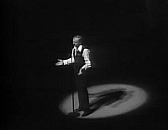 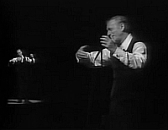 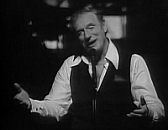
Bob Castella on the piano
accompanies Yves Montand and leads the
instrumental ensemble.
Dansons
la rose is a French song created by Montand in
1980 ‘in memory of’ and to the melody of the chorus
of Roses of
Picardy with lyrics by Eddy Marnay.
The show can
be watched on VK Video. Dansons la rose
is at 29:39.
|
The House of Eliott
directed by Graeme Harper (UK, 1992)
television series: season 2, episode 2
The House of Eliott is a London high
society fashion house in the 1920s. Beatrice Eliott
invites Alice Burgoyne to tea with the idea of hiring
her, because she believes her to be an experienced
saleswoman with an established list of clientele.
While they discuss the matter in the elegant tearoom,
a violin and piano duo plays Roses of Picardy.
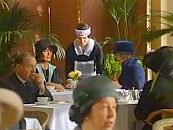
Actually one doesn't see the two
musicians. This performance of Roses of Picardy
was probably recorded especially for the episode.
The episode can be watched on dailymotion.
Roses of Picardy is at 18:23.
|
[Keepsake: Roses of
Picardy]
Barbershop Harmony Society (USA, 1993)
videoed performance
In 1993, at the Barbershop Harmony
Society's Harmony University in St Joseph, Missouri,
Keepsake sings Roses
of Picardy arranged for barbershop quartet.
The Barbershop Harmony Society uploaded
the video to YouTube.
|
Performance: Message for
Posterity
written by Dennis Potter and directed
by David Jones (UK, 1994)
television play
London, 1967: a committee of the House
of Commons commissions a socialist Welsh painter,
James Player, to
do a portrait of Sir David Browning who had
been a long serving Tory prime minister. Browning,
retired in the country, is aging and becoming
confused.
He turns the television on, mumbling, ‘I hope they sing Roses
of Picardy for a change.’
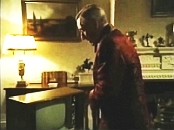
One day, he falls asleep in his garden
and has a nightmare of the Great War. Visions of
trenches and cemeteries mix with a sustained machine-like soft dissonant drone
and a warbling soprano singing Roses
of Picardy. James Player
suddenly arrives, paying a first visit to David
Browning. He wakes him up and introduces himself:
– My name is James Player … the painter, Sir.
– Ah yes, the
painter, in the hush of the
silvery dew!
Player does not get Browning's quotation from Roses of Picardy:
– I beg your pardon.
– You interrupted an unscheduled doze, Mr. Player.
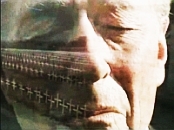
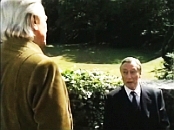
Another day, Clara Browning is driving
to her grandfather's. The car radio is playing Roses of Picardy.
She gets tired of it, ‘Oh,
brother!’ and switches the radio
off.
The nightmarish visions mix with the
chorus of Roses of Picardy sung by the soprano Florence Smithson with
an orchestra (London, July? 1917). And the radio plays
a waltz version of Roses of
Picardy by Victor
Silvester and His Ballroom Orchestra (UK, circa 1960).
Roses of Picardy was included in
Cream in My
Coffee, another television play written by
Dennis Potter and produced in 1980.
|
Johnny and the Dead
directed by Gerald Fox (UK, 1994)
television series: episode 3
England, the 1990s: the Blackbury
cemetery is sold to property developers. The dead
appear to Johnny, a boy who likes strolling around
there; they ask him to help them save their cemetery.
Two of the dead, Fletcher and Einstein,
decide to go to their favorite pub after so many
years. They find that the place hasn't changed much,
but to them the jukebox is making terrible music.
Fletcher presses a button and instantly Roses of
Picardy takes over. Einstein starts humming the
chorus.
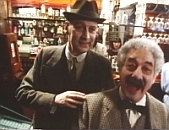
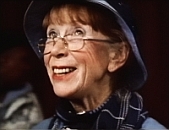
This tune of another age spreads
confusion and, although a middle-aged lady sings
along, all customers and staff run out when the
pinball machine and the jukebox both short-circuit.
The dead are left alone in the dark and have a beer,
much to their delight.
Roses of Picardy is performed
by Freddy Gardner on the saxophone with Peter Yorke
and His Concert Orchestra (London, UK, 1948).
|
Black Holes (I buchi neri)
directed by Pappi Corsicato (Italy, 1995)
Adamo and Angela are two tormented souls
in search of tenderness and love. He is a homosexual
whose job is driving a truck to take rotten bananas to
the dump. She is a prostitute.
Once he dreams that they are making love
at the bottom of the Gulf of Naples. Suddenly, dozens
of bananas floating in the water sink over him while
she surfaces.
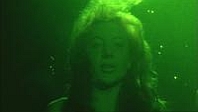 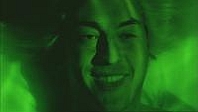 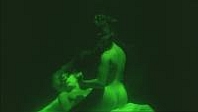 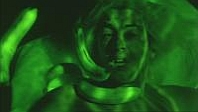 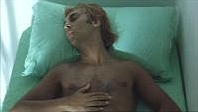
This dream sequence is accompanied by Roses
of Picardy performed by Eddie Calvert on the
trumpet, with Norrie Paramor and His Orchestra
(London, UK, 31 January 1955).
Black
Holes can be watched on OK.RU. Roses of Picardy
is at 53:47.
|
[West By Northwest: Roses
of Picardy]
Barbershop Harmony Society (USA, 1995)
videoed performance
On 7 July 1995, at the Barbershop
Harmony Society's International Convention in Miami
Beach, Florida, West
By Northwest sings Roses of Picardy
arranged for barbershop quartet.
The Barbershop Harmony Society uploaded
the video to YouTube.
|
Roses of Picardy
directed by Steven Mochrie (UK, 1998)
short film
After stealing a Somme veteran's medal,
an aimless young man is haunted by visions of the war,
while the old soldier relives his childhood for the
first time since the war.
Information related to this film is
extremely scanty. One can only assume that Roses
of Picardy is performed in
it.
|
Great Battles of the Great
War: Here Comes Kitchener's Army
directed by Ed Skelding (UK, 1999)
television documentary: episode 2
This documentary is dedicated to the
Battle of the Somme (1916).
A quiet piano version of the chorus of Roses
of Picardy is the background music to its
conclusion.
‘The price was the death toll of more
than a million men on all sides … Some historians
claimed the Battle of the Somme as a British victory,
but in winning it, a generation was lost.’
This performance of Roses of
Picardy was probably recorded especially for
the documentary.
The documentary can be watched on YouTube.
Roses of Picardy is at 47:51.
|
Léargas: Ná Lig Sinn i
nDearmad... [Léargas:
Lest We Be Forgotten...]
directed by Pat Butler (Ireland, 2003)
television documentary
This documentary remembers the some
fifty-five thousand Irish nationalists who fell
fighting with the British Army in the Great War.
The Irish writer Pól Ó Muiri is in
Albert (Somme, France) on his way to the battlefield
where his own relation, James Murray, died in 1916.
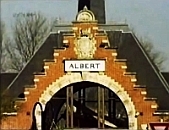
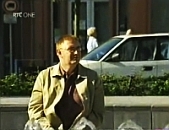
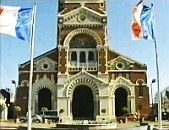
This sequence in Albert (from
the railway station to the basilica) is accompanied by
the chorus of Roses of
Picardy performed by the tenor John McCormack with an orchestra
conducted by Josef Pasternack (Camden, New Jersey,
USA, 1919).
Part of this documentary can be
watched on YouTube.
Roses of Picardy is at 2:44.
|
Ladies in Lavender
directed by Charles Dance (UK, 2003)
The coast of Cornwall in 1936: two
elderly spinster sisters, Ursula and Janet, take into
their home and soon into their hearts, a young Polish
shipwreck survivor, Andrea. Ursula has a dream: she as
a young girl is rolling in a
sunny field in a loving embrace with Andrea;
but soon in her dream, Andrea is looking tenderly at
their neighbour, a young lady the sisters are a little
jealous of.
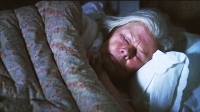 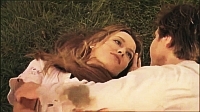
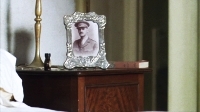
The chorus of Roses of Picardy
is the background music to Ursula's dream and
continues into the next sequence, just long enough to
show a photograph of a soldier on Janet's bedside
table. Janet, a volunteer nurse in the Great War,
became very close to this soldier whose wounds she
tended, and who later died fighting.
Roses of Picardy is sung by
the tenor John McCormack, with Edwin Schneider at the
piano (New York, 1928). Dream-like reverberation and
echo were added to the original recording.
Ladies in Lavender can be watched
on VK Video. Roses of Picardy
is at 1:01:24.
|
A Little Light Music: Friday
Night Is Music Night
directed by Ian Russell (UK, 2005)
televised concert
The first ever television recording of
the popular BBC music programme ‘Friday Night Is Music Night’ was broadcast on BBC
Four on 8 October 2005. It had been recorded on 5
August at the Mermaid Theatre in London while
broadcast live on Radio 2, with the BBC Concert
Orchestra conducted by John Wilson. Roy Hudd was the presenter.
Roy Hudd announces Roses of Picardy:
‘In 1916, Roses of Picardy became terrifically
popular in parlours, pubs, and barrack rooms … [And
later] it became a mainstay of request shows like “Housewives' Choice and
“Two-way
Family Favourites”.’
Then he introduces the soprano Janis Kelly.
John Wilson's arrangement, as sung by
Janis Kelly, includes the first verse only and the
chorus of Roses of
Picardy, followed by a repeat of the
chorus by the orchestra alone for the first half until
the singer joins in for
the rest of the song.
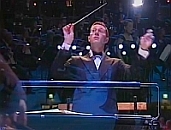 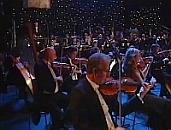 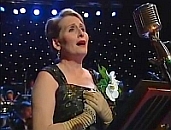
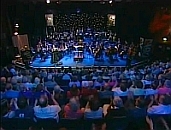
The story by Roy Hudd of the
popularity of Roses of Picardy is true, except
that the song—published in December 1916, could not
have been popular until 1917.
The concert can be watched on YouTube. Roses of Picardy
is announced at 22:21, and performed at 23:20.
|
La Nuit des Talents [Talent Awards Night]
Conseil général de la Somme (France,
2006)
videoed event
On 25 January 2006 at Mégacité, in
Amiens, the Somme General Council rewarded nine
talents from the Somme department, well known in their
professional or association circles for their craft or
industrial, scientific or artistic activities. The
event was filmed and stored on a 2-DVD set distributed
by the General Council.
The evening was also the opportunity to
launch a year of commemoration of the 90th
anniversary of the Battle of
the Somme.
At the opening, a short film is shown:
A hand is seen writing a poem with a fountain pen,
‘Rose of Picardy.’ This is followed by an archival
photograph of a soldier sitting and writing on his
lap. Superimposed: ‘A true ode to love, “Les roses de
Picardie” has been a famous poem since 1916, when a
British soldier wrote it during the Battle of the
Somme ...’ Then follow landscapes, monuments, stelae,
cemeteries (as one can see them today in the
department), interspersed with superimposed shots of
the hand writing the poem. Some of those sites of
remembrance are the property of each of the allied
nations against Germany during World War Ⅰ.
On stage, the pianist Jean-Pierre Baudon accompanied
the film, drawing his inspiration from the score
written by Haydn Wood for Roses of Picardy in
his Bouquet of Happy Memories.
Later in the evening, Roses of
Picardy (the chorus only) was played in two
musical interludes, first a jazz version by the Romain
Brizemur Trio, then a rock version by Jay Morales.
Finally at the close the evening, Roses
of Picardy was performed by the opera singer
Jean-Philippe Courtis and the Musicaa Chamber Chorus,
in the version written by Haydn Wood for his Bouquet
of Happy Memories. They were accompanied by
Jean-Pierre Baudon on piano.
The lyrics to Roses of Picardy
were probably written in 1916, but they were not
written by a British soldier during the Battle of the
Somme. Their author, Fred E. Weatherly, was a lawyer
in England. In addition, Roses of Picardy,
published on 4 December 1916, was not famous until
1917, the lyrics themselves not having previously been
published as a poem.
During the evening, the Musicaa Chamber
Chorus, accompanied by Jean-Pierre Baudon, performed
all the songs that Haydn Wood included in his Bouquet of Happy Memories.
|
Lilies: The Sea
directed by Roger Goldby (UK, 2006)
television series: episode 5
Liverpool in the 1920s: the Moss family
has invited Billy's friend Nazzer for tea. Billy and
Nazzer fought the war on the same ship. They were
torpedoed. Nazzer lost both his legs and one arm; he
is now in a care home. For the occasion, Billy has
also invited another friend, Queenie, to join them.
They all gather around the pianola and
sing the chorus of Roses of Picardy.
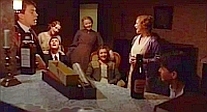 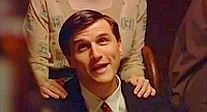
Nazzer – That was great!
Queenie – Ah naw, pink is teal to a glass eye. But
doesn't it make you think about... you know, the war?
Billy – There weren't many roses in our war, Queenie.
It was fought at sea.
Nazzer – It's just a song, Bill.
Queenie – Aw, isn't he lovely? And you know after a
few drinks you forget you're are a cripple.
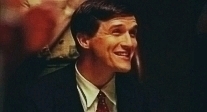 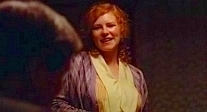
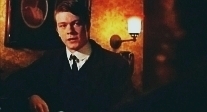 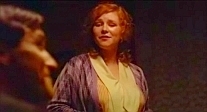
This scene can be watched on YouTube. Roses of Picardy
is at 8:40.
|
Downton Abbey
directed by James Strong (UK, 2011)
television series: season 2, episode 8
Yorkshire, 1919: cousins of Lavinia have
given her a gramophone. She tries it out with Lady
Mary who puts on a record of Roses of Picardy.
The dowager Countess of Grantham does not welcome this
new technology in Downton Abbey Castle.
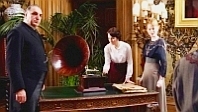
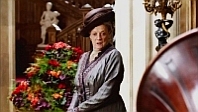
Roses of Picardy was recorded
specially for the episode by the tenor Alfie Boe,
accompanied by James Morgan on piano. One hears the
song, as it quickly fades into the background,
starting from the piano introduction through the
second line of the first verse. The recording was
processed to sound like a 78 rpm record.
|
War Horse
directed by Steven Spielberg (USA,
2011)
Dartmoor, Devon, 1914: to pay the rent,
Ted Narracott sells his son Albert's beloved horse
Joey to Captain Nicholls of the British Army. Nicholls
promises Albert that he will take good care of the
horse and possibly bring it back to him after the war.
Captain Nicholls and Joey go off to
train for battle, and Joey meets and becomes friends
with another horse. While they are nuzzling, the song
Roses of Picardy subtly begins, played on a gramophone while Nicholls, still in
England, draws a portrait of Joey to send to Albert.
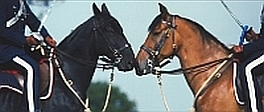 
Nicholls and Joey with their unit have
been transferred to France. The song carries on for a
short moment over a
shot of the cavalry who is going to attack a
German unit at Quiévrechain in 1914.
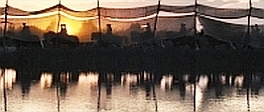
Since Roses of Picardy was
not written until 1916, there is a chronological
discrepancy here. Sung by the tenor John McCormack
with an orchestra conducted by Josef Pasternack
(Camden, New Jersey, USA, 1919), one hears the chorus
only on a loop.
|
Birdsong
directed by Philip Martin (UK,
2011)
television movie: part 1
A trench near Béthune, 1916 : Lieutenant
Wraysford and Captain Weir get a break in a dugout.
Weir has a shave before he half-heartedly opens a
package sent by his mother while Wraysford plays
solitaire and turns over the Queen of Spades.
A faintly audible gramophone is playing
Roses of Picardy.
Roses of Picardy was not
recorded until 1917, and Philip Martin chose a
recording from 1919, by the tenor John McCormack with
an orchestra conducted by Josef Pasternack (Camden,
New Jersey, USA).
Another song was substituted for Roses
of Picardy on the DVD of Birdsong.
Part 1 can be watched on VK Video. Roses of Picardy
is at 13:42.
|
[Roses de Picardie par
Guylène Laur et Jean-Yves Duchesne]
directed by Jean-Michel Legros
aka Yendoful Tito (France, 2011)
videoed performance
Dancing to Roses of Picardy in
the community hall at Valuéjols (Cantal, France) en
2011.
Guylène Laur with Jean-Yves Duchesne on
accordion (and his small ensemble) sings Dansons
la rose [Let's Dance the Rose] a French song
created by Yves Montand in 1980 ‘in memory of’ and to
the melody of the
chorus of Roses of Picardy with
lyrics by Eddy Marnay.
Yendoful Tito uploaded the video to YouTube.
|
Les Fils du vent
[Sons of the Wind]
directed by Bruno Le Jean
(France)
documentary
This feature-length documentary portrays
gypsy jazz artistes who perpetuate the legacy of
Django Reinhardt.
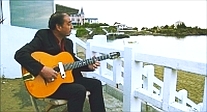
At Saint-Quay-Portrieux
(Côtes-d'Armor, France), one of
them, Tchavolo Schmitt, plays a uniquely contemplative
rendition of Roses
of Picardy while sitting on a deck
overlooking the English Channel (year
unknown: Les Fils
du vent was shot over eight years and
released in 2012).
|
[The Good Old Days: Roses
of Picardy]
Barbershop Harmony Society (USA, 2012)
videoed performance
On 3 July 2012, at the Barbershop
Harmony Society's International Collegiate Contest in
Portland, Oregon, The
Good Old Days sings Roses of Picardy
arranged for barbershop quartet.
The Barbershop Harmony Society uploaded
the video to YouTube.
|
Before the Winter Chill
(Avant l'hiver)
directed by Philippe Claudel
(France, Luxembourg, 2012)
Paul, a successful French neurosurgeon,
has been married to Lucie for about thirty years. They
are still very much in love, although their
relationship has developed ongoing patterns of lack of
communication. After a
tense dinner, he puts a record on and they
tenderly dance to Roses of Picardy, sung in
English.
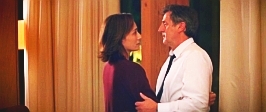
It is about then that they start getting
anonymous bouquets of red roses, delivered to his
office at the hospital, or
at home.
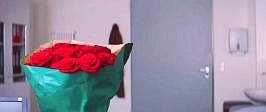
The recording chosen by Philippe
Claudel includes the chorus only of Roses of
Picardy, by the Irish entertainer Sonny Knowles
(circa 1972).
Avant l'hiver can be watched on OK.RU.
Roses of Picardy is at 9:06.
|
[Legacy: Roses of
Picardy]
Barbershop Harmony Society (USA, 2013)
videoed performance
On 12 January 2013, at the Barbershop
Harmony Society's International Midwinter Convention
in Orlando, Florida, Legacy sings Roses of Picardy
arranged for barbershop quartet.
The Barbershop Harmony Society uploaded
the video to YouTube.
|
An Accidental Soldier
directed by Rachel Ward
(Australia, 2013)
television movie
A town in France near to the front,
March 1918: Australian soldiers are idly hanging
around outdoors waiting to
be called up to the front.
– Think we'll ever get there?
– I think there is no hurry to get myself shot.
– Yeah, we can't go back without seeing the show, can
we? It wouldn't be right.
A gramophone installed on the street is playing Roses
of Picardy.
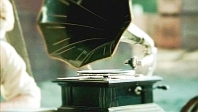
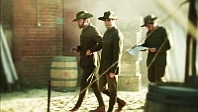
Sung by the tenor Ernest Pike with an
orchestra conducted by Arthur Wood (London, 12 May
1917), one hears the beginning of the chorus of Roses
of Picardy which quickly fades into the
background.
|
Jeff and Joel's House Party:
[Roses of Picardy]
Jeff and Joel's House Party (USA,
2013)
videoed concert
A session of traditional jazz was held
at Joel and Donna's Historic Farmhouse in Guilford,
Connecticut, in
April 2013. Six musicians joined together and
played the chorus of Roses of Picardy.
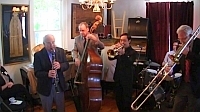
This performance of Roses of Picardy
can be watched on YouTube.
|
Roses of Picardy (Song),
Haydn Wood & Fred. E. Weatherly
Patricia Hammond and Matt Redman
(UK, 2014)
videoed performance
The mezzo soprano Patricia Hammond and
her duet partner, the multi-instrumentalist Matt
Redman recorded Roses of
Picardy at Wigmore Hall, London, in February
2014.
Redman arranged the accompaniment and
played it on classical guitar.
This performance of Roses of Picardy
can be watched on vimeo.
|
[Dansons la rose [Let's Dance the Rose]]
Michel Debray (France,
2014-2022)
videoed performance
Dansons la rose is a French song
created by Yves Montand in 1980 ‘in memory of’ and to
the melody of the
chorus of
Roses
of Picardy with lyrics by Eddy Marnay.
The painter and libertarian writer
Michel Debray has recorded at home in Ault (Somme,
France) Dansons la
rose three times for his YouTube
channel:
in 2014,
uploaded to YouTube on 7 March 2014 under
the title of Roses de Picardie.
References are not known for the accompaniment.
in 2016,
uploaded to YouTube on 7 March 2016 under
the title of Roses de Picardie.
Debray first sang a cappella the lyrics in French of Roses of
Picardy by Pierre d'Amor, published in 1918,
then he segued into Dansons la rose, still a
cappella.
Dansons la rose is at 2:24.
in 2022,
uploaded to YouTube on 26 May 2022 under the
title of Dansons la rose de Picardie.
References are not known for the
accompaniment.
|
The Danish Girl
directed by Tom Hooper (UK, 2015)
Copenhagen, Denmark, 1926: Einar and
Gerda Wegener, both emerging painters, are a happily
married young
couple.
While chatting at a party, they recount
the day they first met:
– We went for coffee, and after,
I kissed him. And it was the strangest thing. It was
like kissing myself.
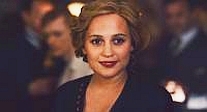 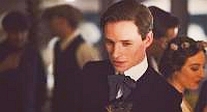
One can hear softly in the background an
ensemble playing Roses of Picardy.
Roses
of Picardy is performed by Certains L'Aiment
Chaud, an all-female jazz orchestra
(Soignolles-en-Brie, France, January 2002). One hears
their introduction, which is the melody of the verses
of Roses of Picardy.
|
Art Abscon, Secret Show in
Athens, Travelling with Ukulele: Roses of
Picardy
Art Abscon (Greece, 2015)
videoed concert
His concert in Athens having been
cancelled, Art Abscon gave a late night concert to a
small audience in
a garden on a roof in Athens on 3 October
2015. Playing an electric ukulele, he sang his version
of Roses of Picardy
accompanied by Stelios on accordion.
Mainly based on the chorus of Roses
of Picardy, this version includes the line
‘Europa is falling apart.’
Art Abscon uploaded this performance of
Roses of Picardy to YouTube.
|
The People Remember: Courage
and Sacrifice
directed by Tim Fransham (UK,
2015)
television documentary series: season 2,
episode 3
This season of the BBC series The
People Remember was recorded in October 2015 at
the Imperial War Museum in Duxford, Cambridgeshire. It
was presented by Sophie Raworth and Andy Torbet.
Midway through the programme, Raworth's voice
announces, ‘still to come on today's programme: (now
starts Roses of Picardy's intro) the world's
only one-handed concert pianist, Nicholas McCarthy,
plays a wartime classic.’
Towards the end of the programme, the
presenters talk with McCarthy who recalls how Roses
of Picardy was a
‘massive, massive hit’ in World War Ⅰ. ‘I
wanted to arrange this piece for left hand alone as a
tribute to that era.’
Nicholas McCarthy plays the verse and
the chorus of Roses of Picardy.
The episode can be watched on dailymotion. Nicholas McCarthy
is announced at 24:19, and Roses of Picardy is
at 40:38.
|
Louise by the Shore (Louise en hiver)
directed by Jean-François
Laguionie (France, 2015)
Louise is an elderly lady who misses the
last train of the summer season and finds herself
alone in a seaside resort which as usual, is deserted
come autumn. She is surprised that none of her
acquaintances inquires about her disappearance, but
she decides to face the situation with determination
and ends up finding real pleasure in
it.
Louise by the Shore begins with
an album of vintage postcards among which are inserted
the credit titles. These postcards represent scenes of
seaside holidays. The credits are accompanied by the
chorus of Roses of Picardy played by an
orchestra.

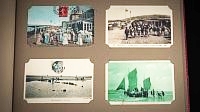
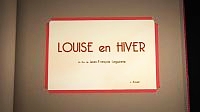
Once a week in the evening Louise
strolls along the empty sea wall promenade, amusing
herself with visions of the summer crowd, and she
stops at the tennis court to watch a couple playing
tennis under the light of hanging lamps. The chorus of
Roses of Picardy is the background music to the
sequence.
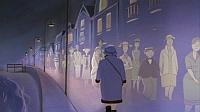
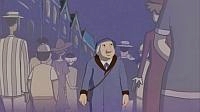
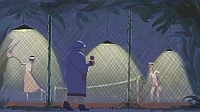
One day, poking around an abandoned
landfill, her attention is drawn to a sputtering
transistor radio; she grabs it in the hope of a good
deal, but the batteries are almost dead and the device
only emits short and uncertain bits of the melody of Roses
of Picardy: ‘[But there's]
never a rose [like] you!’
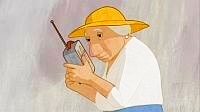
The chorus of Roses of Picardy
was arranged and orchestrated for the movie by Pascal
Le Pennec. It was recorded by the Orchestre
symphonique de Bretagne conducted by Johannes Le
Pennec (Rennes, Brittany, October 2015). Audio
engineering added a Twilight Zone touch to the
recording.
|
Cézanne et moi
directed by Danièle Thompson
(France, 2015)
Paul Cézanne and
Émile Zola, and friends, with
their wives or lovers, spend a
leisurely day in the country beside a river.
Writing notes (Zola),
painting from nature (Cézanne), picnic lunch on the grass,
boat-rides ...
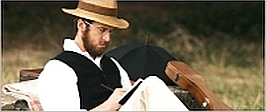 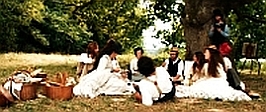
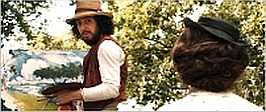
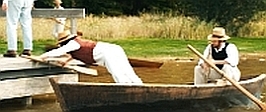
Roses of Picardy is a
predominant non-diegetic feature for most of the
sequence.
Roses
of Picardy is performed by Certains L'Aiment
Chaud, an all-female jazz orchestra
(Soignolles-en-Brie, France, January 2002).
Note that neither Cézanne (died in
1906), nor Zola (died in 1902) would have known Roses
of Picardy.
|
[Roses de Picardie]
Michel Debray (France, 2016)
videoed performance
The painter and
libertarian writer Michel Debray has recorded at
home in Ault (Somme, France) Roses of
Picardie for his YouTube
channel.
He sang a cappella the lyrics in French of Roses of
Picardy by Pierre d'Amor, published in 1918,
and then he segued
into Dansons la rose [Let's Dance the Rose]
still a cappella.
The
recordings of Dansons la rose by Michel
Debray are here
on this page.
Michel Debray uploaded the video to YouTube on 15 March 2016.
|
Old School Jazz Club: [Dansons
la rose [Let's
Dance the Rose]]
directed by Lucas Romero (Brazil, 2016)
videoed performance
On 24 April 2016, the Brazilian quintet
Old School Jazz Club made a video of their version of
Dansons la rose.
John Benedit both sings and plays
guitar.
Dansons la rose is a French song
created by Yves Montand in 1980 ‘in memory of’ and to
the melody of the
chorus of Roses of Picardy with
lyrics by Eddy Marnay.
Old School Jazz Club uploaded the video
to YouTube.
|
Jazz Pirates: Roses of
Picardy
Jazz Pirates (Sweden, 2016)
videoed performance
The quartet Jazz Pirates videoed one of
their versions of Roses of Picardy at home on
Asperö Island, Sweden, on
19 May 2016.
The clarinettist Lasse Collin uploaded
the video to YouTube.
|
Somme and Beyond
Mersey Wave Music (UK, 2016)
videoed event
A commemoration of the Battle of the
Somme and World War Ⅰ, with readings and a concert,
took place in
Liverpool at the St George's Hall Concert
Room on 1 July 2016. It was presented by the Royal
British Legion and Mersey Wave Music.
The mezzo soprano Kathryn Rudge sang Roses
of Picardy, accompanied on piano by Jason Ellis.
A video with highlights of the event was
created.
Mersey Wave Music uploaded the video to
YouTube. Roses of Picardy
is at 15:54.
|
Glen Arven Avenue: Roses
of Picardy
Barbershop Harmony Society (USA, 2016)
videoed performance
On 6 July 2016, at the Barbershop
Harmony Society's International Convention in
Nashville, Tennessee, Glen
Arven Avenue sings Roses of Picardy
as arranged for barbershop quartet by Lou Perry.
The Barbershop Harmony Society uploaded
the video to YouTube.
|
[Canchons pi liries in picard]
Agence régionale de la langue picarde
(France, 2016)
videoed show
Jean-Luc and Delphine Vigneux put on a
show in the Picard language Canchons pi liries in
picard [Songs
and readings in Picard] at the end of the
Chés Wèspes [The Wasps, or The Funny Men] Festival, at Le Crotoy
(Somme, France), on 5 August 2016. The festival was
run and the show videoed by the Picard Language
Regional Agency.
Jean-Luc Vigneux performed the chorus of
Roses of Picardy on a ukulele.
The couple sang in their own way, with
finger snapping to create a back-up rhythm, the chorus
of Roses of Picardy translated in Picard by
Jean-Luc Vigneux.
Finally, still in Picard, Jean-Luc
Vigneux commented to the audience: ‘We have just told
a nice love story, it was written [about] a hundred
years ago by … a Canadian—Wood—it means a piece of
wood … I translated it in Picard from his lyrics … in
English … I didn't make it from Yves Montand … And so,
this is to remember all those poor things, whether
they were Chinese … English, French, or German … who
came to lose their youth in this Somme area and also
in Picardy.’
Note that Wood was not Canadian, but
English. He did not write the lyrics, but composed the
music of Roses of Picardy. The lyrics were
penned by Frederick E. Weatherly.
Yves Montand created in 1980 a song, Dansons
la rose [Let's Dance the Rose]—commonly known as
Roses of Picardy—‘in memory of’ and to the
melody of the chorus of Roses of Picardy with
original lyrics in French by Eddy Marnay.
The videoed show can be watched online. Roses of Picardy
is at 32:18, and J.-L. Vigneux's comments are at
35:03.
|
Wonder Wheel
directed by Woody Allen (USA, 2017)
Humpty is the carousel operator on Coney
Island in the 1950s. As he passes by the Cyclone, one
can hear in the distance a mechanical organ playing a
joyous version of Roses of Picardy.
The next shot shows Humpty on duty at
the carousel which is in motion while the carousel
organ carries on playing Roses of Picardy.
Woody Allen chose the chorus of Roses
of Picardy as played by a Belgian Mortier organ
which was kept in Paul Eakins's collection of musical
machines at Sikeston, Missouri, and recorded circa
1963.
Allen had chosen Roses of Picardy
before, for his film Another
Woman in 1988.
Wonder Wheel can be watched on OK.RU.
Roses of Picardy is at 12:22.
|
Songs of the Great War
National Trust of Guernsey (UK,
2017)
videoed concert
The mezzo soprano Patricia Hammond and
her duet partner, the multi-instrumentalist Matt
Redman, gave a
concert at the National Trust of Guernsey's
Victorian Shop and Parlour, St Peter Port, Guernsey, on 29 April 2017.
Hammond sang Roses of Picardy,
with the accompaniment arranged and played on
classical guitar by Redman.
The National Trust of Guernsey uploaded
the concert to YouTube. Roses of Picardy
is at 13:11.
|
Haydn Wood: Roses of
Picardy, Piano Arrangement by H. M. Higgs
Phillip Sear (UK, 2017)
videoed performance
In July 2017, the English pianist
Phillip Sear from Haywards Heath, West Sussex,
recorded a home video of
himself sight-reading H. M. Higgs's
arrangement of Roses of Picardy for solo
piano.
|
[An evening of song,
reminiscence & nourishment!:
Roses of Picardy - Haydn Wood (Patricia Hammond,
Matt Redman)]
OPEN Ealing (UK, 2017)
videoed concert
On 6 July 2017, the mezzo soprano
Patricia Hammond and her duet partner, the
multi-instrumentalist Matt
Redman, gave a concert of songs of the Great
War at the Orchard Cafe, West Ealing, London.
Hammond told the audience that Roses
of Picardy was used in rehabilitating
shell-shocked soldiers.
She sang Roses of Picardy,
with the accompaniment arranged and played by
Redman, the first verse and chorus on bouzouki, and
the second verse and chorus on classical guitar.
When asked if he had a favourite song,
an audience member answered in a jocular manner:
‘Oh, Roses Are Blooming in Jeopardy, ha! ha!
No, in Picardy!’
Hammond wrongly dated Roses of
Picardy 1913, instead of 1916.
This rendition of Roses of Picardy
can be watched on YouTube. Hammond's
introduction is at 0:00, Roses of Picardy is
at 0:15,
and the audience member appears at 4:30.
|
Gunhild Carling Live:
[Roses of Picardy]
Gunhild Carling (Sweden, 2017)
concert online
This was a one-hour show where jazz
lovers could request songs, and the Carling Band
played them live. It
was broadcast on YouTube every Sunday evening
from Studio Savoy in Stockamöllan, Sweden.
On 16? July 2017, Gunhild Carling on
trombone, Max and Nanna Carling on saxophones, and
their band, performed their arrangement of the chorus
of Roses of Picardy.
Excerpted from the show, this rendition
of Roses of Picardy can be watched on YouTube.
|
Gerald Finley & Julius
Drake
Library of Congress Music
Division (USA, 2018)
videoed concert
The baritone Gerald Finley and the
pianist Julius Drake gave a programme of Germanic and
Russian art song in the Coolidge Auditorium at the
Library of Congress, Washington, DC, on 25 April 2018.
To commemorate the centenary of the end
of World War Ⅰ, they gave Roses of Picardy as
an encore. Finley, who was born in Canada, introduced
it as ‘one of the songs that the Canadians heard
before they found themselves completely demolished at
Vimy Ridge.’
The Library of Congress uploaded the
concert to YouTube. Finley's introduction
is at 1:24:18, and Roses of Picardy is at 1:25:19.
|
[Pacific Ring: Roses
of Picardy]
Barbershop Harmony Society (USA, 2018)
videoed performance
On 5 July 2018, at the Barbershop
Harmony Society's International Convention in Orlando,
Florida, Pacific Ring sings Roses of Picardy
as arranged for barbershop quartet by Lou Perry.
The Barbershop Harmony Society uploaded
the video to YouTube.
|
Pilgrimage: The Road to Rome
directed by Mark O'Brien, Deborah
Lovett, and Lizzie Toms (UK, 2018)
television documentary: episode 1
Eight celebrities with differing faiths
and beliefs tackle the ancient Via Francigena
pilgrimage, from the Italians Alps to Rome.
They cross the river Po on a little
boat sailed by a local, travelling from Lombardy into
Emilia Romagna. The actor Les
Dennis suddenly sings the very beginning of
the chorus of Roses of Picardy—adapted
to the situation: ‘Roses are shining in Lombardy.’
The background music to the documentary carries on
softly under Dennis's singing.
The documentary can be watched on dailymotion. 'Roses of Lombardy'
is at 50:55.
|
BBC Proms: Last Night of the
Proms
directed by Helen Mansfield (UK,
2018)
televised concert: part 2
On 8 September 2018, at the Royal Albert
Hall in London, the Last Night of the Proms marked the
centenary of the
end of World War Ⅰ with a medley of four wartime
songs. The concert was broadcast live.
Roses of
Picardy was performed first by the baritone
Gerald Finley, with the soprano saxophonist Jess
Gillam, and with the BBC Symphony Chorus and the BBC
Singers in the background. The BBC Symphony Orchestra
was conducted by Sir Andrew Davis.
The medley was arranged by Anne Dudley.
|
Rick Stein's Secret France
Denham Productions (UK, 2018)
television documentary: episode 1
The celebrity chef Rick Stein travels in
Picardy on the look out for exciting new recipes and
produce to cook
with.
Stein, en route to the Beaumont-Hamel
Memorial, listens to ‘Roses Are Shining in Picardy which is
making [him] quite emotional.
It was an incredibly popular song during the First
World War.’ He reflects on the 60,000 British
[actually, Commonwealth] casualties on the first day
of the Battle of the Somme, and visits the trenches at the Memorial.
The mix of Roses of Picardy
with Rick Stein's voice suggests that he was not
listening to any music while he was driving his car
and talking to the camera. The chorus of Roses of
Picardy originally sung twice in a row by the
tenor John McCormack with an orchestra conducted by
Josef Pasternack (Camden, New Jersey, USA, 1919) is
the background music to this sequence dedicated to the
Great War in Picardy.
The documentary can be watched on dailymotion. Roses of
Picardy is at 35:47.
|
Générations France Musique,
le live: Haydn Wood,
Roses of Picardy
Radio France (France, 2018)
videoed radio programme
‘Générations
France Musique, le live’ is a weekly radio
programme featuring several musicians performing live
in front of an audience. In studio 106 at Radio France
on 3 November 2018, the soprano Clémentine Decouture,
accompanied on piano by Nicolas Chevereau, performed
several songs created during the First World War,
including Roses of Picardy. She sang the
French version written by Pierre d'Amor and published
in 1918, until the end of the second verse. Then she
sang the chorus in the original English version.
The programme was broadcast on France
Musique. It was videoed by Radio France which uploaded
extracts, including Roses of Picardy, to YouTube.
|
The Royal British Legion
Festival of Remembrance
directed by Bridget Caldwell (UK,
2018)
televised event
On 10 November 2018, at the Royal Albert
Hall in London, the Royal British Legion Festival of
Remembrance paid tribute to those who served and who
lost their lives in the Great War. The event was
broadcast later in the evening on BBC One.
While the orchestra is playing Roses
of Picardy, Adrian Lester reads a letter written
on 12 November 1918 by
Corporal Robert Bloch to his sweetheart:
‘Dear darling Millie … do you remember one Saturday
night, just before we sat down for a quiet tea?
Suddenly, you looked up and asked, “Bobby, how much do
you love me?” I
replied, “I don't know.” … You dropped your
head, and softly sang Roses of Picardy … Last
night, I heard a
chap play Roses of Picardy. And if
you did not come and stand before me, I saw you smile
and I was glad.’
‘When Robert returned home, he proposed
to Millie.’
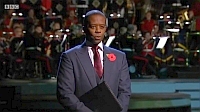
Then the bass baritone, Sir Bryn Terfel,
sings the chorus of Roses of Picardy, still
accompanied by the orchestra.
The Central Band of the Royal Air
Force is conducted by Lieutenant Colonel Darren
Wolfendale.
This event can be watched on YouTube. Roses of Picardy
is at 46:32.
|
[Anthony León, Tenor:
Roses of Picardy]
La Sierra University Department
of Music (USA, 2018)
videoed performance
At La Sierra University's Hole Memorial
Auditorium in Riverside, California, Anthony León, a
tenor student at the University Department of Music,
sang Roses of Picardy accompanied on piano by
Dr Elvin Rodriguez.
Anthony León uploaded the video to YouTube on 22 november 2018.
|
Roses de Picardie
(France, 2019)
videoed concert
In a concert given on 31 March 2019 at
the Robert Gourdain Hall in Bresles (Oise, France),
the Orchestre d'harmonie [concert band] de Beauvais
(Oise), the Beauvais Jules Michelet secondary school
choir, the Beauvais Eustache du Caurroy conservatoire
choir, and the Bresles Condorcet secondary school
choir performed Roses of Picardy conducted by
Régis Emorine.
The lyrics in French published in 1918
are an adaptation by Pierre d'Amor of the original
English lyrics; the arrangement for concert band and
chorus is by Régis Emorine.
Mathilde introduces Roses of Picardy:
‘About ten legends go with the creation of the song …
The most likely is rather romantic. It happened in
1916. The poet saw opposite his house a young lady who
was watering roses. This vision would have given him
the inspiration for the song. The Battle of the Somme
was raging at the time, the front line was not far
away.’ Mathilde then mentions the names of the
lyricist Fred E. Weatherly and of the composer Haydn
Wood.
Note that Fred E. Weatherly actually
remained in England during World War Ⅰ.
This performance of Roses de
Picardie can be watched on YouTube.
|
An die Musik, To Music: Roses
of Picardy
Palm Beach Opera (USA, 2020)
videoed performance
On 15 May 2020 during COVID-19 and its
restrictions, the apprentice tenor Juan Hernández and
the coach Ksenia Leletkina on piano, performed Roses
of Picardy for the Palm Beach Opera's ‘An die
Musik’ digital recital series.
Hernández introduced Roses of
Picardy: ‘This song is very very dear to me … I
like to interpret it as a song that talks about that
one person you really do keep close to your heart;
that one person that not only do you hope, but you
know that you will see again.’
This performance of Roses of Picardy
can be watched on vimeo. Hernández's introduction
to the song is at 0:45, and he sings at 1:12.
|
[Living Room Requests:
From Deep Purple to Black Velvet Band and Polish
Tango]
Patricia Hammond and Matt Redman
(UK, 2020)
digital concert
During COVID-19 and its restrictions,
the mezzo soprano Patricia Hammond and her duet
partner, the
multi-instrumentalist Matt Redman, performed
in their living room in London, a series of short
concerts to be
watched on YouTube, made up of song requests sent in
by individuals.
Hammond sings Roses of Picardy,
with the accompaniment arranged and played by Redman,
the first verse and
chorus on bouzouki, and the second verse and
chorus on contraguitar.
Hammond wrongly dated Roses of
Picardy 1913, instead of 1916.
This concert was uploaded to YouTube on 9 June 2020. Roses
of Picardy is at 31:17.
|
Roses of Picardy as Sung by Adam LeFebvre
Adam LeFebvre (USA, 2020)
videoed performance
Adam LeFebvre, from Honolulu, Hawaii,
the bass in the Full Measure Quartet, sings all four
parts to Roses of Picardy as arranged for
barbershop quartet by Lou Perry.
The title of the video reproduces the
title of the song, as designed on Roses of Picardy
sheet music in the USA since 1923.
Adam LeFebvre uploaded his video to YouTube
on 10 June 2020.
|
An Aria a Day: Clarissa
Foulcher, Roses
of Picardy
Opera Queensland (Australia, 2020)
videoed performance
‘An Aria a Day’ was a daily digital
programme launched by Opera Queensland to support
artistes during the COVID-19 lockdown in Australia.
The Australian mezzo soprano Clarissa
Foulcher presents at home a Roses of Picardy
sheet music which is dated in writing June 1920. She
says that the song was one her father's favourites.
She sings the first verse and the chorus
of Roses of Picardy, accompanied on piano by
Narelle French.
|
Falling Stars
directed by Michael Strassen (UK,
2020)
musical act digital production
Rehearsals for Falling Stars had
just started at the Union Theatre in London when a
COVID-19 lockdown was announced in the UK. It was then
decided to film the show and make it available on
Stream.Theatre.
Peter Polycarpou, who wrote the show,
comes on stage and remembers when he found years ago a
tattered songbook in an old antique shop. One can hear
an intro and the beginning of Roses of Picardy
being played on piano. He and Sally Ann Triplett who
plays the part of the shopkeeper, will perform a whole
bunch of forgotten songs with some stories about the
writers and their lives. The stage set represents the
antique shop.
Sally Ann Triplett introduces Roses
of Picardy, a ballad ‘written in 1916. It was
mostly sung by British soldiers after they had left
sweethearts in France or Flanders. The lyrics were
written by Frank [sic] Weatherly after he had fallen
in love with a French widow while she was protecting
him at a health centre in France. He was also a lawyer
… The tune by Haydn Wood is sublime.’ She adds that
Haydn Wood's music in his lifetime was compared
favourably to Elgar's. Peter Polycarpou sings Roses
of Picardy, accompanied off-screen by Mark
Dickman on piano.
Polycarpou sings expressively but he is
too free with the lyrics, changing words, and even a
line in the second verse for a line in the first
verse.
Note that Fred E. Weatherly actually
remained in England during World War Ⅰ.
|
Roses of Picardy
Flo Bonner (UK, 2020)
videoed performance
During COVID-19 and its restrictions and
on the occasion of Remembrance Day, Flo Bonner at home
sings Roses of Picardy to help raise funds for
the Royal British Legion.
‘Dedicated to all those who risked and
gave their lives and to my grandad who has wanted me
to sing this for a
long time!’
She sings along to the recording of Roses
of Picardy, orchestrated by David Jones, and
performed by the Central Band of the Royal British
Legion, conducted by David Cole (London, 2014?).
Flo Bonner uploaded her video to YouTube on 10 November 2020.
|
All About Yves Montand
(Montand est à nous)
directed by Yves Jeuland (France, 2021)
documentary
Yves Jeuland begins his film on Yves
Montand remembering how unfortunate he was, not to be
able to attend Montand's recital in Toulouse in 1982.
Since then, he has listened ‘without respite’ to the
recording of the recital at the Olympia Hall in Paris
in 1981. He shows the ‘titles Montand put down in
writing in preparation for his solo show.’ Among them:
Roses of Picardy.
He carries on with three short excerpts
from this recording, starting with Roses of
Picardy.
These excerpts are from Yves Montand's
recital at the Olympia Hall in Paris, as recorded for television in 1981.
In this film, Roses of Picardy
is actually Dansons la rose [Let's Dance the
Rose], a French song created by
Montand in 1980 ‘in memory of’ and to the
melody of the chorus of Roses of Picardy with
lyrics by Eddy
Marnay.
|
Roses of Picardy
The Fiddle Channel (UK, 2022)
tutorial
In this jazz violin tutorial the London
violinist Chris Haigh teaches the chorus of Roses
of Picardy. He first plays a simplified skeleton
melody, then demonstrates ways of making each phrase
more rhythmically interesting. Then he shows a version
of the melody based on the Roses of Picardy
recording by Tchavolo Schmitt's ensemble. Finally
Haigh plays his own example of Roses of Picardy
as a jazz solo, concentrating on approaches to bowing.
This tutorial can be watched on YouTube. Haigh's successive
renditions of Roses of Picardy are at 1:31,
5:26, and 9:52.
|
Roses of Picardy
videoed by Sam Gee (UK, 2022)
videoed performance
The tenor Tim Kennedy accompanied on
piano by Pete Durrant recorded Roses of Picardy
in Victoria Wood Hall at Hallé St Peter's, Manchester,
in August 2022.
Tim Kennedy uploaded the video to YouTube.
|
Roses of Picardy (1916),
Haydn Wood (arr. Stephen Hough)
Chamber Music Society of Palm Beach
(USA, 2022)
videoed performance
The SPA Trio—Susanna Phillips, soprano;
Paul Neubauer, viola; and Anne-Marie McDermott, piano—gave their
concert, Songs from the Salon, at the Norton
Museum of Art in West Palm Beach, Florida, on
7 December 2022. The concert included Roses
of Picardy as arranged by Stephen Hough with a
viola obbligato.
This performance of Roses of Picardy
can be watched on YouTube.
|
[Roses of Piccardy[sic]
(Haydn Wood),
by Søvilla JazzBand at Axelborg Bodega]
videoed by MoLahBel (Denmark, 2023)
videoed performance
The Søvilla JazzBand gave their version
of Roses of Picardy with vocals at the
Axelborg Bodega restaurant in
Copenhagen on 3 December 2023.
This performance of Roses of Picardy
can be watched on YouTube.
|
Queer
directed by Luca Guadagnimo
(Italy, USA, 2024)
Mexico City, in the early 1950s: William
Lee, an American expat, gay, and a heroin addict,
leads a disillusioned life among other members of the
small American community he lives in.
At the Ship Ahoy, a pub he frequents, a
jukebox plays quietly Roses of Picardy.

The recording chosen includes the chorus
of Roses of Picardy only, performed by
Frankie Laine with the Paul Dunlap Orchestra (Los
Angeles, June 1947).
Queer can be watched on VK Video. Roses of Picardy
is at 48:26.
|
[MaroSwing 4tet - Les
Roses de Picardie de Haydn Wood
version de Django Reinhardt]
MaroSwing (France, 2024)
videoed performance
The gypsy jazz quartet MaroSwing gave a
concert in the garden of the chapel of the White
Penitents in Valréas (Vaucluse, France) on 29 July
2024. The concert included a swing version of Roses
of Picardy featuring guitar and violin, inspired
by Django Reinhardt and Stéphane Grappelli.
Note that the mention ‘version de
[version by]’ Django Reinhardt should be understood
as ‘inspired by the
style of’ Django Reinhardt. Reinhardt
himself never created a version of Roses of
Picardy, whereas Stéphane
Grappelli recorded a medley including Roses
of Picardy with Hubert Clavecin and His
Rhythms circa
1961.
This performance of Roses of
Picardy can be watched on YouTube.
|
 [Roses of Picardy, Duet] Aspidistra
Orchestra: 2026 New Year Concert [Roses of Picardy, Duet] Aspidistra
Orchestra: 2026 New Year Concert
Sands Films (UK, 2026)
online concert
In a concert of light classical music at
the Sands Films Music Room in Rotherhithe, London, and
broadcast live online on 4 January 2026, the
Aspidistra Drawing Room Orchestra, led by the oboist
Adam Bakker, performed Haydn Wood's duet version of Roses
of Picardy. The singers were Liz Menezes and
Camilla Cutts. Wood's piano accompaniment had been
arranged for the orchestra by Sharudin Rosunally.
The cellist introduced Roses of
Picardy: ‘Haydn Wood [composed] it during the
First World War, but it isn't actually about the war,
it's a song about first love and separation. The
lyrics suggest that Picardy is a rural Arcadia of
poplars and roses, not the bloody battlefield. But the
tranquillity must have resonated with the public and
it's become a song of hope and resilience.’
|
|